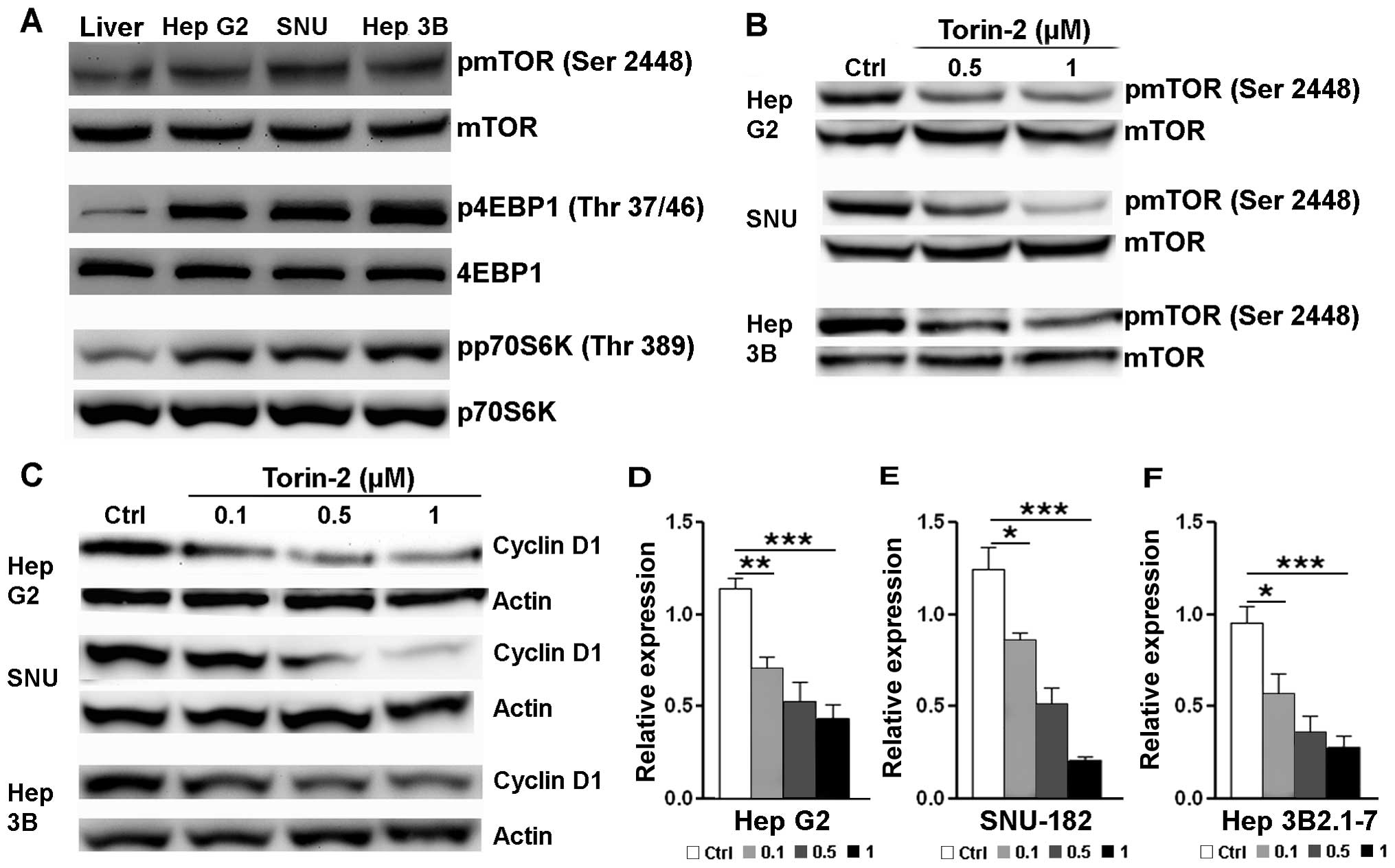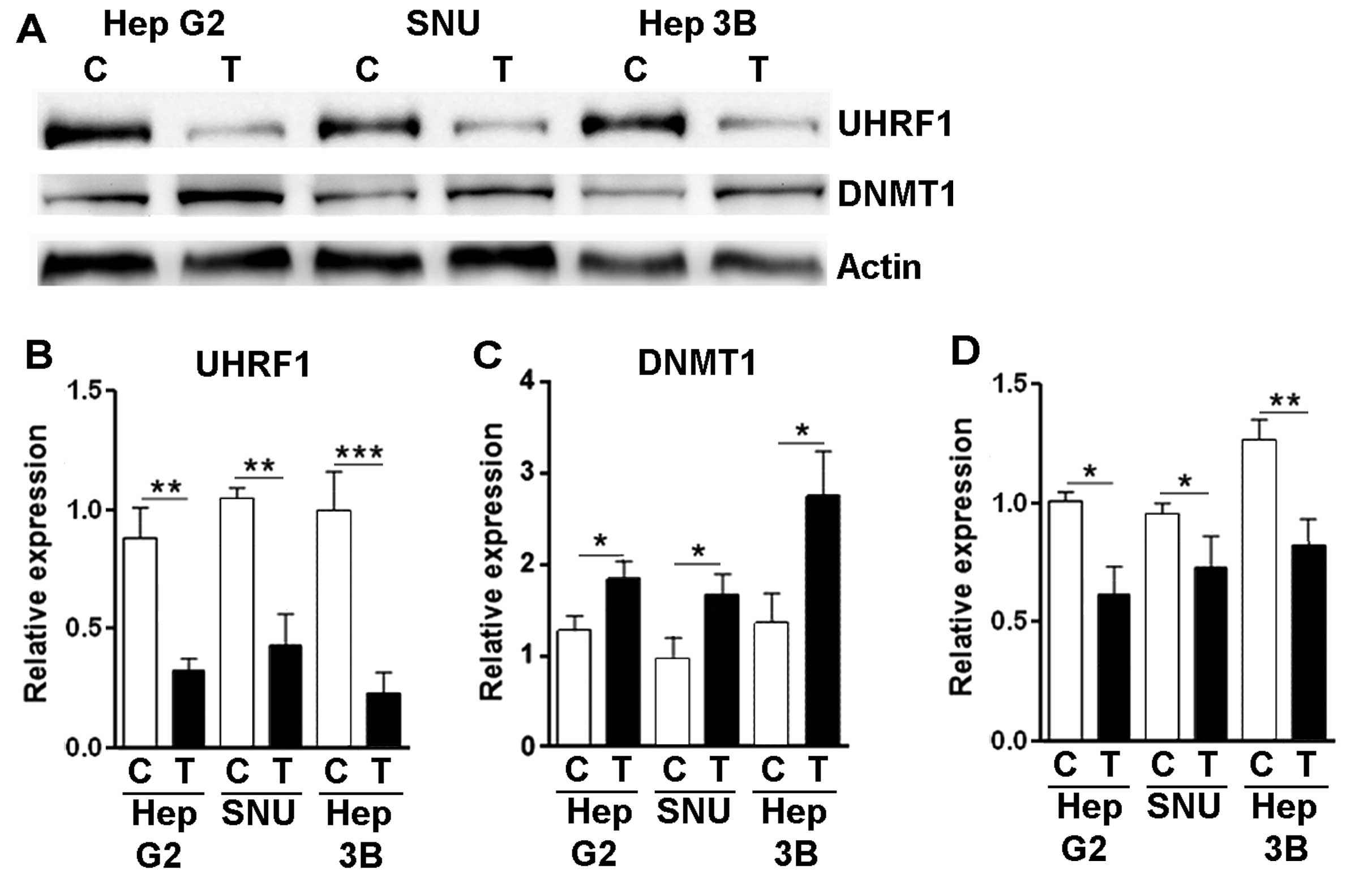|
1
|
Olsen SK, Brown RS and Siegel AB:
Hepatocellular carcinoma: Review of current treatment with a focus
on targeted molecular therapies. Therap Adv Gastroenterol. 3:55–66.
2010. View Article : Google Scholar : PubMed/NCBI
|
|
2
|
Breuhahn K, Longerich T and Schirmacher P:
Dysregulation of growth factor signaling in human hepatocellular
carcinoma. Oncogene. 25:3787–3800. 2006. View Article : Google Scholar : PubMed/NCBI
|
|
3
|
Moeini A, Cornellà H and Villanueva A:
Emerging signaling pathways in hepatocellular carcinoma. Liver
Cancer. 1:83–93. 2012. View Article : Google Scholar
|
|
4
|
Sanz-Cameno P, Trapero-Marugán M, Chaparro
M, Jones EA and Moreno-Otero R: Angiogenesis: From chronic liver
inflammation to hepatocellular carcinoma. J Oncol. 2010:2721702010.
View Article : Google Scholar : PubMed/NCBI
|
|
5
|
Matter MS, Decaens T, Andersen JB and
Thorgeirsson SS: Targeting the mTOR pathway in hepatocellular
carcinoma: Current state and future trends. J Hepatol. 60:855–865.
2014. View Article : Google Scholar :
|
|
6
|
Zhou Q, Lui VW and Yeo W: Targeting the
PI3K/Akt/mTOR pathway in hepatocellular carcinoma. Future Oncol.
7:1149–1167. 2011. View Article : Google Scholar : PubMed/NCBI
|
|
7
|
Newell P, Toffanin S, Villanueva A, Chiang
DY, Minguez B, Cabellos L, Savic R, Hoshida Y, Lim KH,
Melgar-Lesmes P, et al: Ras pathway activation in hepatocellular
carcinoma and anti-tumoral effect of combined sorafenib and
rapamycin in vivo. J Hepatol. 51:725–733. 2009. View Article : Google Scholar : PubMed/NCBI
|
|
8
|
Guertin DA and Sabatini DM: Defining the
role of mTOR in cancer. Cancer Cell. 12:9–22. 2007. View Article : Google Scholar : PubMed/NCBI
|
|
9
|
Wörns MA and Galle PR: HCC therapies -
lessons learned. Nat Rev Gastroenterol Hepatol. 11:447–452. 2014.
View Article : Google Scholar
|
|
10
|
Martelli AM, Chiarini F, Evangelisti C,
Cappellini A, Buontempo F, Bressanin D, Fini M and McCubrey JA: Two
hits are better than one: Targeting both phosphatidylinositol
3-kinase and mammalian target of rapamycin as a therapeutic
strategy for acute leukemia treatment. Oncotarget. 3:371–394.
2012.PubMed/NCBI
|
|
11
|
Zhu AX, Kudo M, Assenat E, Cattan S, Kang
YK, Lim HY, Poon RT, Blanc JF, Vogel A, Chen CL, et al: Effect of
everolimus on survival in advanced hepatocellular carcinoma after
failure of sorafenib: The EVOLVE-1 randomized clinical trial. JAMA.
312:57–67. 2014. View Article : Google Scholar : PubMed/NCBI
|
|
12
|
Zhou Q, Wong CH, Lau CP, Hui CW, Lui VW,
Chan SL and Yeo W: Enhanced antitumor activity with combining
effect of mTOR inhibition and microtubule stabilization in
hepatocellular carcinoma. Int J Hepatol. 2013:1038302013.
View Article : Google Scholar : PubMed/NCBI
|
|
13
|
Liu Q, Wang J, Kang SA, Thoreen CC, Hur W,
Ahmed T, Sabatini DM and Gray NS: Discovery of
9-(6-aminopyridin-3-yl)-1-(3-(trifluoromethyl)phenyl)benzo[h][1,6]naphthyridin-2(1H)
- one (Torin2) as a potent, selective, and orally available
mammalian target of rapamycin (mTOR) inhibitor for treatment of
cancer. J Med Chem. 54:1473–1480. 2011. View Article : Google Scholar : PubMed/NCBI
|
|
14
|
Liu Q, Xu C, Kirubakaran S, Zhang X, Hur
W, Liu Y, Kwiatkowski NP, Wang J, Westover KD, Gao P, et al:
Characterization of Torin2, an ATP-competitive inhibitor of mTOR,
ATM, and ATR. Cancer Res. 73:2574–2586. 2013. View Article : Google Scholar : PubMed/NCBI
|
|
15
|
Ahmed M, Hussain AR, Bavi P, Ahmed SO, Al
Sobhi SS, Al-Dayel F, Uddin S and Al-Kuraya KS: High prevalence of
mTOR complex activity can be targeted using Torin2 in papillary
thyroid carcinoma. Carcinogenesis. 35:1564–1572. 2014. View Article : Google Scholar : PubMed/NCBI
|
|
16
|
Bonder MJ, Kasela S, Kals M, Tamm R, Lokk
K, Barragan I, Buurman WA, Deelen P, Greve JW, Ivanov M, et al:
Genetic and epigenetic regulation of gene expression in fetal and
adult human livers. BMC Genomics. 15:8602014. View Article : Google Scholar : PubMed/NCBI
|
|
17
|
Robertson KD: DNA methylation,
methyltransferases, and cancer. Oncogene. 20:3139–3155. 2001.
View Article : Google Scholar : PubMed/NCBI
|
|
18
|
Bianchi C and Zangi R: UHRF1 discriminates
against binding to fully-methylated CpG-Sites by steric repulsion.
Biophys Chem. 171:38–45. 2013. View Article : Google Scholar
|
|
19
|
Bashtrykov P, Jankevicius G, Jurkowska RZ,
Ragozin S and Jeltsch A: The UHRF1 protein stimulates the activity
and specificity of the maintenance DNA methyltransferase DNMT1 by
an allosteric mechanism. J Biol Chem. 289:4106–4115. 2014.
View Article : Google Scholar :
|
|
20
|
Mudbhary R, Hoshida Y, Chernyavskaya Y,
Jacob V, Villanueva A, Fiel MI, Chen X, Kojima K, Thung S, Bronson
RT, et al: UHRF1 overexpression drives DNA hypomethylation and
hepatocellular carcinoma. Cancer Cell. 25:196–209. 2014. View Article : Google Scholar : PubMed/NCBI
|
|
21
|
Pi JT, Lin Y, Quan Q, Chen LL, Jiang LZ,
Chi W and Chen HY: Overexpression of UHRF1 is significantly
associated with poor prognosis in laryngeal squamous cell
carcinoma. Med Oncol. 30:6132013. View Article : Google Scholar : PubMed/NCBI
|
|
22
|
Choi YJ, Li X, Hydbring P, Sanda T,
Stefano J, Christie AL, Signoretti S, Look AT, Kung AL, von Boehmer
H, et al: The requirement for cyclin D function in tumor
maintenance. Cancer Cell. 22:438–451. 2012. View Article : Google Scholar : PubMed/NCBI
|
|
23
|
Averous J, Fonseca BD and Proud CG:
Regulation of cyclin D1 expression by mTORC1 signaling requires
eukaryotic initiation factor 4E-binding protein 1. Oncogene.
27:1106–1113. 2008. View Article : Google Scholar
|
|
24
|
Simioni C, Cani A, Martelli AM, Zauli G,
Tabellini G, McCubrey J, Capitani S and Neri LM: Activity of the
novel mTOR inhibitor Torin-2 in B-precursor acute lymphoblastic
leukemia and its therapeutic potential to prevent Akt reactivation.
Oncotarget. 5:10034–10047. 2014.PubMed/NCBI
|
|
25
|
Kimura T, Takabatake Y, Takahashi A and
Isaka Y: Chloroquine in cancer therapy: A double-edged sword of
autophagy. Cancer Res. 73:3–7. 2013. View Article : Google Scholar : PubMed/NCBI
|
|
26
|
Polivka J Jr and Janku F: Molecular
targets for cancer therapy in the PI3K/AKT/mTOR pathway. Pharmacol
Ther. 142:164–175. 2014. View Article : Google Scholar
|
|
27
|
Villanueva A, Chiang DY, Newell P, Peix J,
Thung S, Alsinet C, Tovar V, Roayaie S, Minguez B, Sole M, et al:
Pivotal role of mTOR signaling in hepatocellular carcinoma.
Gastroenterology. 135:1972–1983. 2008. View Article : Google Scholar : PubMed/NCBI
|
|
28
|
Ashworth RE and Wu J: Mammalian target of
rapamycin inhibition in hepatocellular carcinoma. World J Hepatol.
6:776–782. 2014. View Article : Google Scholar : PubMed/NCBI
|
|
29
|
Knox JJ, Qin R, Strosberg JR, Tan B,
Kaubisch A, El-Khoueiry AB, Bekaii-Saab TS, Rousey SR, Chen HX and
Erlichman C: A phase II trial of bevacizumab plus temsirolimus in
patients with advanced hepatocellular carcinoma. Invest New Drugs.
33:241–246. 2014. View Article : Google Scholar : PubMed/NCBI
|
|
30
|
Kelley RK, Nimeiri HS, Munster PN, Vergo
MT, Huang Y, Li CM, Hwang J, Mulcahy MF, Yeh BM, Kuhn P, et al:
Temsirolimus combined with sorafenib in hepatocellular carcinoma: A
phase I dose-finding trial with pharmacokinetic and biomarker
correlates. Ann Oncol. 24:1900–1907. 2013. View Article : Google Scholar : PubMed/NCBI
|
|
31
|
Zhou Q, Lui VW, Lau CP, Cheng SH, Ng MH,
Cai Y, Chan SL and Yeo W: Sustained antitumor activity by
co-targeting mTOR and the microtubule with temsirolimus/vinblastine
combination in hepatocellular carcinoma. Biochem Pharmacol.
83:1146–1158. 2012. View Article : Google Scholar : PubMed/NCBI
|
|
32
|
Wang Z, Jin W, Jin H and Wang X: mTOR in
viral hepatitis and hepatocellular carcinoma: Function and
treatment. Biomed Res Int. 2014:7356722014.PubMed/NCBI
|
|
33
|
Bockstaele L, Kooken H, Libert F, Paternot
S, Dumont JE, de Launoit Y, Roger PP and Coulonval K: Regulated
activating Thr172 phosphorylation of cyclin-dependent kinase
4(CDK4): Its relationship with cyclins and CDK 'inhibitors̓. Mol
Cell Biol. 26:5070–5085. 2006. View Article : Google Scholar : PubMed/NCBI
|
|
34
|
Choi YJ and Anders L: Signaling through
cyclin D-dependent kinases. Oncogene. 33:1890–1903. 2014.
View Article : Google Scholar
|
|
35
|
Takuwa N, Fukui Y and Takuwa Y: Cyclin D1
expression mediated by phosphatidylinositol 3-kinase through
mTOR-p70(S6K)-independent signaling in growth factor-stimulated NIH
3T3 fibroblasts. Mol Cell Biol. 19:1346–1358. 1999.PubMed/NCBI
|
|
36
|
Yang ZJ, Chee CE, Huang S and Sinicrope
FA: The role of autophagy in cancer: Therapeutic implications. Mol
Cancer Ther. 10:1533–1541. 2011. View Article : Google Scholar : PubMed/NCBI
|
|
37
|
Sui X, Chen R, Wang Z, Huang Z, Kong N,
Zhang M, Han W, Lou F, Yang J, Zhang Q, et al: Autophagy and
chemotherapy resistance: A promising therapeutic target for cancer
treatment. Cell Death Dis. 4:e8382013. View Article : Google Scholar : PubMed/NCBI
|
|
38
|
Li P, Du Q, Cao Z, Guo Z, Evankovich J,
Yan W, Chang Y, Shao L, Stolz DB, Tsung A, et al: Interferon-γ
induces autophagy with growth inhibition and cell death in human
hepatocellular carcinoma (HCC) cells through interferon-regulatory
factor-1 (IRF-1). Cancer Lett. 314:213–222. 2012. View Article : Google Scholar :
|
|
39
|
Tai WT, Shiau CW, Chen HL, Liu CY, Lin CS,
Cheng AL, Chen PJ and Chen KF: Mcl-1-dependent activation of Beclin
1 mediates autophagic cell death induced by sorafenib and SC-59 in
hepatocellular carcinoma cells. Cell Death Dis. 4:e4852013.
View Article : Google Scholar : PubMed/NCBI
|
|
40
|
Allen KD, Mata BA, Gabr MA, Huebner JL,
Adams SB Jr, Kraus VB, Schmitt DO and Setton LA: Kinematic and
dynamic gait compensations resulting from knee instability in a rat
model of osteoarthritis. Arthritis Res Ther. 14:R782012. View Article : Google Scholar : PubMed/NCBI
|
|
41
|
Zhou Y, Sun K, Ma Y, Yang H, Zhang Y, Kong
X and Wei L: Autophagy inhibits chemotherapy-induced apoptosis
through downregulating Bad and Bim in hepatocellular carcinoma
cells. Sci Rep. 4:53822014.PubMed/NCBI
|
|
42
|
Guo XL, Li D, Sun K, Wang J, Liu Y, Song
JR, Zhao QD, Zhang SS, Deng WJ, Zhao X, et al: Inhibition of
autophagy enhances anticancer effects of bevacizumab in
hepatocarcinoma. J Mol Med Berl. 91:473–483. 2013. View Article : Google Scholar :
|
|
43
|
Yang PM, Liu YL, Lin YC, Shun CT, Wu MS
and Chen CC: Inhibition of autophagy enhances anticancer effects of
atorvastatin in digestive malignancies. Cancer Res. 70:7699–7709.
2010. View Article : Google Scholar : PubMed/NCBI
|
|
44
|
Li J, Yang B, Zhou Q, Wu Y, Shang D, Guo
Y, Song Z, Zheng Q and Xiong J: Autophagy promotes hepatocellular
carcinoma cell invasion through activation of
epithelial-mesenchymal transition. Carcinogenesis. 34:1343–1351.
2013. View Article : Google Scholar : PubMed/NCBI
|
|
45
|
Li X, Wu D, Shen J, Zhou M and Lu Y:
Rapamycin induces autophagy in the melanoma cell line M14 via
regulation of the expression levels of Bcl-2 and Bax. Oncol Lett.
5:167–172. 2013.
|
|
46
|
Ravikumar B, Berger Z, Vacher C, O'Kane CJ
and Rubinsztein DC: Rapamycin pre-treatment protects against
apoptosis. Hum Mol Genet. 15:1209–1216. 2006. View Article : Google Scholar : PubMed/NCBI
|
|
47
|
Unoki M: Current and potential anticancer
drugs targeting members of the UHRF1 complex including epigenetic
modifiers. Recent Patents Anticancer Drug Discov. 6:116–130. 2011.
View Article : Google Scholar
|
|
48
|
Bronner C, Fuhrmann G, Chédin FL, Macaluso
M and Dhe-Paganon S: UHRF1 links the histone code and DNA
methylation to ensure faithful epigenetic memory inheritance. Genet
Epigenet. 2009:29–36. 2010.PubMed/NCBI
|




















